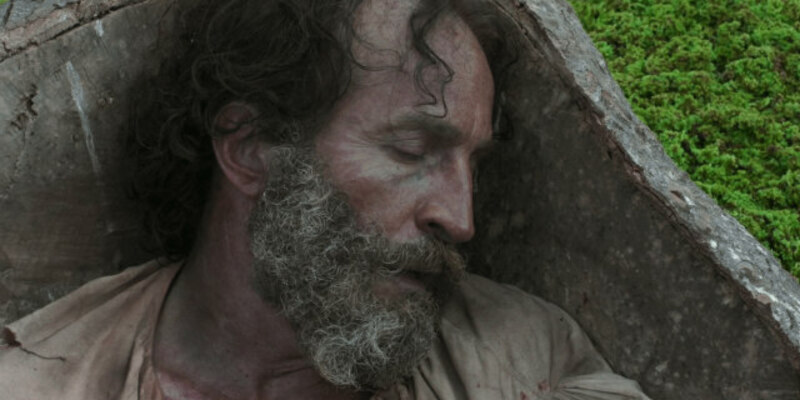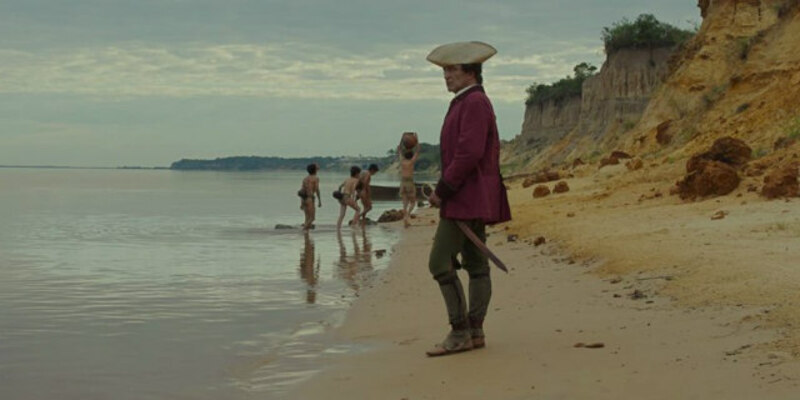
Review by
John Bennett
Directed by: Lucretia Martel
Starring: Daniel Giménez Cacho, Lola Dueñas, Matheus
Nachtergaele, Juan Minujín, Nahuel Cano

A long nine years after the critical success of
The Headless Woman, Argentina's most fêted auteur, Lucrecia Martel, brought her
much-anticipated fourth feature, Zama, to the 2017 Venice Film Festival. Based on the celebrated novel by
Antonio di Benedetto, Zama is a challenging film whose
leisurely pace and confounding découpage take a while to warm to. But as
soon as you become pleasantly dizzy from the sense of suffocating mugginess
that Zama is able to conjure, Martel's virtuosity as a stylist
will mysteriously reveal itself.

Borrowing di Benedetto's narrative set in 17th century Paraguay,
Zama details the inert adventures of Don Diego de Zama (Daniel Giménez Cacho), a Spanish corregidor (a colonial judicial functionary) stationed at a
tropical colonial outpost. Eager to return to his family in Spain, Zama
consistently puts in requests to his lazy, indulgent superior, whose
promises - much to Zama's consternation - inevitably go unfulfilled. Added
to the magistrate's vexation is the fact that he is unable to consummate an
affair with the slightly daffy socialite Luciana Piñares de Luenga (played
by Pedro Almodóvar regular Lola Dueñas - the Almodóvar brothers
helped produce Zama). Driven slightly crazy by his inability to escape his hot purgatorial
world, Zama joins a small posse in search of the elusive bandit, Vicuña
Porto. The sense of tangible reality in Zama seems to slowly
dissolve from here.
This decade has been thrilling for those filmgoers who, like me, relish the
work of filmmakers who unleash subconscious fever dream bonanzas on the
screen. In works like Von Trier's Melancholia, Carax's Holy Motors, Sorrentino's The Great Beauty, Gomes'
Arabian Nights
trilogy, Dumont's Slack Bay, and especially Lynch's
Twin Peaks: The Return, filmmakers have happily had a certain degree of freedom to let their
intuition-driven phantasmagorias run wild. With Zama, Martel firmly establishes herself among the ranks of these filmmakers.
Yet whereas certain directors in this list use their wild imagery and
narratives to simply explore the nature of the human mind, Martel wields her
ambitious vision while keeping certain social issues in mind. Just as Ciro
Guerra did with
Embrace of the Serpent, Martel is interested in the impotent decadence and absurdity of
colonialism. Though Martel's social commentary is not as pointed as
Guerra's, Zama can be read as anti-colonial in that the hero
is never presented as sympathetic or noble. He is an invasive species who is
trapped and consumed, like a bug in a Venus flytrap, by the very land he
occupies.

If Zama's bold, wonderfully perplexing storytelling weren't cause enough for
praise, one could admire the truly novel aesthetic that Martel advances in
her newest film. Since La Ciénaga - and on display to a
greater extent in The Headless Woman - Martel has played
subtly and intelligently with what we are able to see and hear. In
Zama, Martel layers planes of visibility within her shots as if each one were a
puppet theatre for her existential Punch and Judy show. Walls, stables,
dunes, and even horses in the foregrounds of shots obstruct events whose
sounds we hear or we think we hear. We hear the sounds of violence only
visually hinted at above a thick expanse of tall swamp grass. A shoulder of
a man's nightshirt seen through a crack in a door allows us to realise along
with Zama that Luciana has chosen a different, superior lover over him.
Other filmmakers would relay such moments through quick editing, but Martel
confidently holds these shots for relatively long periods of time, allowing
us to marvel at her controlled compositions and sink further into our own
aesthetic intoxication brought on by the film's ability to mess with our
sense of time and space.
Such stylistic moments depend, of course, on sound, and Martel's
soundscapes are just as lush as her visuals. The dense, steady droning of
cicadas in the muggy tropical weather hypnotises us as much as the
consistent lull of the sound of waves crashing on a shore. Occasionally, a
sleepy tropical ballad like 'Always in My Heart' (memorably used during the
opening credits of Wong Kar-Wai's Days of Being Wild) wafts across the soundtrack, simultaneously easing us into the film's
sleepy rhythm while also driving us slightly mad along with the long-faced
Don Diego. Some of the most aesthetically satisfying moments are those in
which Martel employs a loud, mysterious sound that slides down in pitch with
the same ethereal majesty as Miklós Rózsa's theremin scores for
Spellbound and The Lost Weekend. These aural moments are paradoxically of a piece with the mired pace of
the film just as they shock us into awareness that something significant is
happening, even if that significance - like a character heard but not seen
behind a wall - is not immediately available to us.

It's only fair to give warning that Martel's film can be something of an
endurance test. At certain points during the film's nearly two-hour running
time, Zama's drowsy rhythm can instill a feeling of impatience, a feeling that can be
exacerbated by the lethargic inertia that hangs about Don Diego as thick as
the jungle air. By the time Zama has ended, it's not entirely
clear whether we have witnessed a story that took the time it needed to
accurately express its ideas or whether we have been prisoners of moments of
soupy stylistic indulgence. But even if the latter is true,
Zama's sheer aesthetic originality, its sensuality elicited through uniquely
cinematic means, is enough to have made those nine years worth the wait, and
it's enough to make us hungry for the next time we can have the pleasure of
experiencing a work by this fascinating filmmaker.


Zama is on MUBI UK now.
